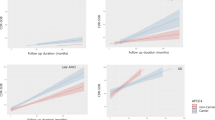Summary.
Today, cognitive impairment can be successfully treated with acetylcholine esterase inhibitors (AChE-I) in many, but not all, patients with Alzheimer's disease (AD). To investigate the relation between tacrine treatment, inheritance of ApoE ε4 alleles, and rate of progression, the differences in MMSE and CIBIC scores (efficacy parameters) after 6 and 12 months of tacrine (an AChE-I) treatment were investigated in 145 AD patients. Of these, 84 were ApoE ε4-positive (ApoE4) and 61 were ApoE ε4-negative (ApoE2-3). No differences were found after 6 months of treatment, but after 12 months the CIBIC scores revealed that the ApoE4 patients had declined more than the ApoE2-3 patients (p < 0.05). No differences were found for the last 6 months of treatment. The results primarily suggest a faster rate of decline in the ApoE4 AD compared to the ApoE2-3, but may also reflect that ApoE ε4 genotype inheritance is a negative predictor of treatment effect of tacrine in AD patients.
Similar content being viewed by others
Author information
Authors and Affiliations
Additional information
Received July 4, 2000; accepted October 25, 2000
Rights and permissions
About this article
Cite this article
Sjögren, M., Hesse, C., Basun, H. et al. Tacrine and rate of progression in Alzheimer's disease – relation to ApoE allele genotype. J Neural Transm 108, 451–458 (2001). https://doi.org/10.1007/s007020170066
Issue Date:
DOI: https://doi.org/10.1007/s007020170066




